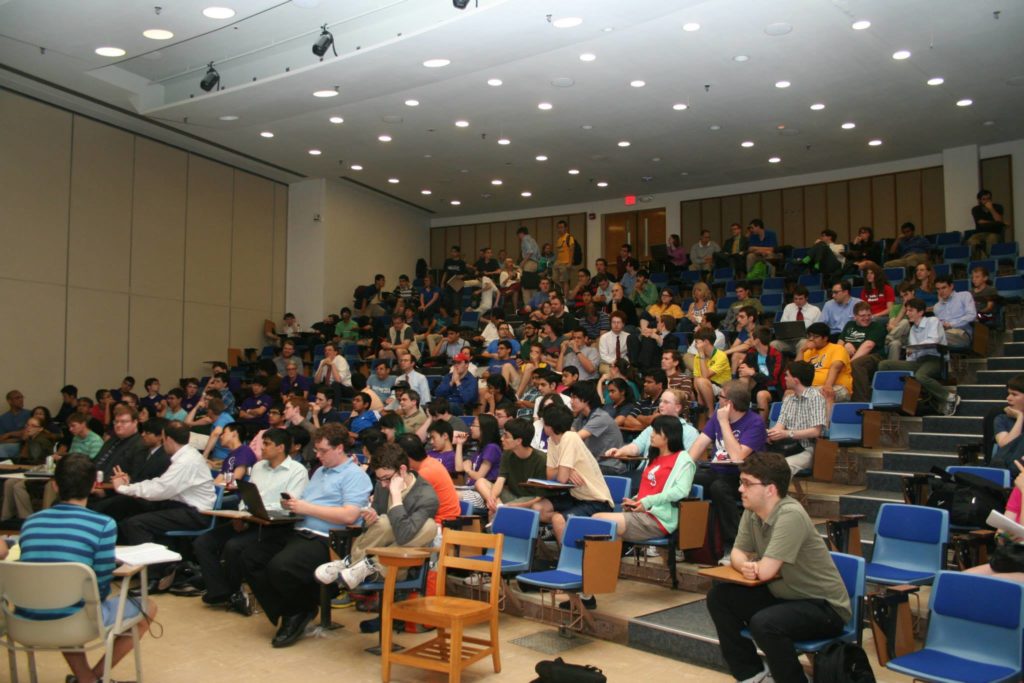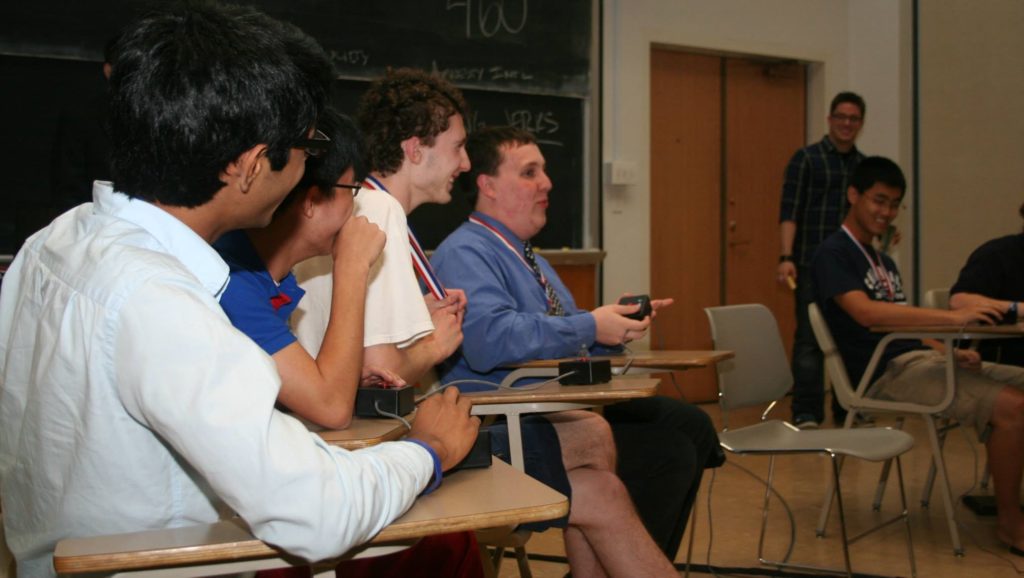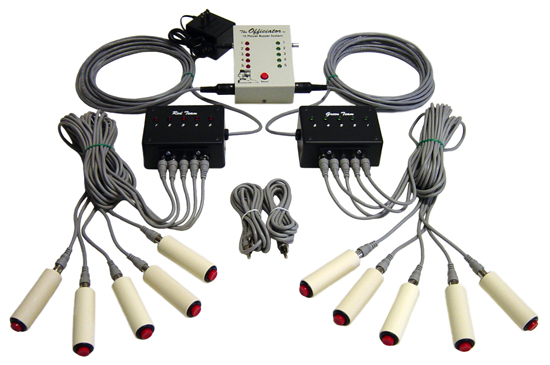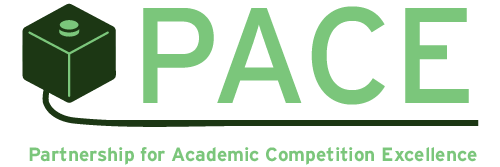By Matt Jackson

In June 2013, seventy-two teams converged upon the University of Maryland in College Park. They came from near and far, some from a few minutes away, others flying in from Texas or California – nineteen states, one province, and the District of Columbia in total. For the next two days, lights went off, stakes stayed high, and strange phrases from “Aristotle” to “Zeeman slower” and everything in between, were heard in many rooms as many teams harbored a hope of national victory. What was it that brought them all together at the 2013 National Scholastic Championship? When the Partnership for Academic Competition Excellence comes together to promote academic competition across the country, what do those competitions look like?
In short: What is Quizbowl? If you’re a person who just stumbled across the word, a student who might want to start a team, a curious family member, reporter, or faculty advisor, or an administrator who would like to learn more about a competition that is ever-growing nationwide, this article is for you.
Defining it simply:
Quizbowl is a competition where teams of players use a buzzer system to score points for their team by answering questions on a wide range of academic topics.
What are the key ingredients of a quizbowl match?
- Two teams of 1 to 4 players
- The buzzer system, which any individual player can use to ring in and indicate that he/she knows the answer to a question
- A packet of questions, which is read to both teams by a moderator
- “Tossup” questions that both teams’ players can buzz in on when they know the answer, without having to wait until the end of the question
- Some form of “bonus” questions allowing an individual team more chances at points
- A running score for each team, which goes up each time a member of that team offers a correct answer to a question
To explain in more detail how the game is played and what it looks like, I’ll go over the key underlined words in the simple definition.
- Quizbowl is a competition.
Some people call quizbowl a game. A few might compare it to a sport – “the Super Bowl of the mind,” as one journalist put it recently. Others still value quizbowl even further, making it a way of life. In any case, a key part of the game is competitive. Each match has a score, and the team with more points at the end wins the match. In a tournament setting, one team has to win more games than all the others to emerge as that day’s champion.
Across the country, Quizbowl is usually played at single-day tournaments. Tournaments are usually hosted by local high schools, colleges, or universities on weekends. Because a lot of quizbowl matches can fit into one day (the average match at the PACE National Scholastic Championship is roughly 25 to 30 minutes long), tournaments allow teams to arrive at the host school early in the morning (usually around 9 AM) play a large number of matches (usually between five and ten; sometimes more) against many different schools. Some regions also feature local high school quizbowl leagues, where teams from a small conference meet a few times over a period of several weeks. Leagues might meet on school-day afternoons, or on weekends like the usual tournament, and some converge into a larger inter-league or state championship.
- In any quizbowl match, two teams face off, competing with one another to answer questions for points.
Quizbowl is a team game, played between teams of players representing their school. Within a given match, competitions usually allow up to four students from the same school to play on one team at a given time. But there’s no reason for a school to limit the number of people who want to play or turn away interested players. Schools with enough dedicated quizbowl players can actually send multiple teams to competitions, putting their best four players on the “A team” for the day, their next best four on the “B team,” and so on, so that everybody in the school’s quizbowl club gets a chance to play.

- Each quizbowl game features a buzzer system that players use to answer questions
A tabletop buzzer system works a lot like the buzzers seen on Jeopardy! and other televised game shows. Each player gets a handheld button connected to a colored light; those buttons and lights are connected by electronic cables to a central box, which sits by the moderator who reads out the questions for the round. When one player pushes their button (“buzzes in”) to signify that they know the answer, their light comes on, usually accompanied by a noise or a beep, and the other players in the room are electronically locked out from making additional buzzes. This ensures that the first player to buzz always gets a chance to answer first, even if two or more players buzz in only a split-second apart. The moderator can then hit a reset button between questions so all players can get ready to buzz in on the next question.

- Quizbowl questions let teams show how much they know, not just what they know.
The questions which get read to both teams in a quizbowl matches are called “tossup questions,” or just “tossups.” Tossups are played individually, so teammates cannot confer with the player who buzzed in. Each team can buzz in once per tossup, so if Player A buzzes in and answers incorrectly, A’s teammates are locked out for the rest of the question. The base value for getting a tossup correct is generally 10 points.
The biggest difference between quizbowl and Jeopardy! is this: any player can buzz in during the middle of a tossup question to try and beat the other team to answering it. There’s no need to wait for the end of the question to be read. (In other words, a quizbowl player can buzz in when she knows the answer, not just to show that she knows the answer.) This change makes quizbowl really click as a game in its own right. Because any player on either team can buzz in to try and answer during the reading of a tossup question, each tossup question has to have multiple clues about the answer. Clues within a tossup are arranged in descending order of difficulty, allowing teams that know more about the answer to buzz in earlier. (This descent in difficulty is called pyramidality.) It wouldn’t be good if questions were only one or two clues long – every player who knew the answer would buzz in all at once, and it would be hard to tell which team is actually more knowledgeable about the answer. In a world of extremely short questions, teams that know a lot more about the question topics might still lose out frequently due to mere reflexes – and games would be far less fair because of it. So you’ll never see a one-clue quizbowl question like:
Who went on a Midnight Ride to warn Boston of British soldiers in a Longfellow poem?
Instead, a pyramidal tossup might look something like this:
This character has a friend who “wanders and watches, with eager ears” until he hears the “measured tread of the grenadiers.” This character gives “a cry of defiance, and not of fear, a voice in the darkness, a knock at the door.” His actions occur on the “eighteenth of April, in Seventy-five,” and are cued by “a lantern aloft in the belfry arch of the North Church tower as a signal light.” For 10 points, name this character whose midnight ride to warn of impending redcoats was described by Henry Wadsworth Longfellow.
From High School Academic Pyramid Questions [HSAPQ], Virginia High School League 2012-13 question set
ANSWER: Paul Revere
If a team wants to get points for answering this question, it doesn’t just have to know that Paul Revere exists – it has to know more about Mr. Revere than the other team it’s playing against. Teams with more in-depth knowledge of will prevail, even if the questions are on basic material, since they will buzz in earlier and more often. The best quizbowl teams do two things: they get familiar with more of the possible answers to questions, and they become experts on the things they already have cursory knowledge of. Quizbowl questions allow for teams to show breadth of knowledge across many general topics or depth of knowledge in a narrower set of specialties.
Most quizbowl matches don’t consist entirely of tossups. Almost all mainstream tournaments also feature “bonus” questions, which are directed at only one team and don’t require the answering team to buzz in. At the PACE NSC, and most local tournaments affiliated with it, teams are rewarded every time they get a tossup correct with a three-part bonus question just for their team. The three parts of the bonus are worth 10 points each, and teammates can confer with each other before answering them. One part is easy, another part is quite difficult, and the third part is of a middle difficulty somewhere in between – a setup which, again, rewards teams for making their knowledge base deeper. After the bonus question is finished, the moderator goes back to reading the next tossup question. Local tournaments in your area may vary this formula somewhat – some events have eight-question “lightning rounds” or vary up the scoring in different ways during different parts of the game.

- Quizbowl questions are written on a wide range of academic topics
Unlike single-subject competitions such as National History Bee and Bowl or National Ocean Science Bowl, the subject matter of quizbowl questions is wide-ranging, covering many disciplines. Here is a list of the typical academic categories that quizbowl questions derive from:
- Literature (novels, short stories, drama, poetry),
- Science (biology, chemistry, physics, astronomy, mathematics, computer science, earth science, laboratory science),
- History (American, British, European, world),
- Fine arts (painting, music, opera, jazz, ballet, photography, sculpture, architecture, film),
- Religion, mythology, and philosophy,
- Social sciences (psychology, economics, anthropology/sociology, linguistics),
- Geography (cities, states/provinces/regions, natural landmarks),
- Current events
You will hardly see any “trivia,” in quizbowl, if by “trivia” we mean insignificant tidbits like the number of ridges on the edge of a quarter coin or the inventor of roller skates. The answers to quizbowl questions come from core disciplines of the academic canon and recent trends of intellectual or cultural significance. Many of the answers will be basic – Shakespeare plays, US Presidents, chemical elements, and other staples of the student’s knowledge base come up in quizbowl questions frequently. In fact, in quizbowl it’s a good thing if lots of teams know the answer to any given question! But teams are also challenged to develop deep specialty knowledge as well. We want questions to be playable by teams across the whole range of skill levels, so teams of all experience levels can show how deep their knowledge is on the same set of questions, and newer players can still recognize or answer many questions without being overwhelmed.
Many question sets also have a small number of questions on sports, popular culture, and/or general knowledge, but those topics make up a small minority of the questions any given round (between 0 and 10 percent). The best teams go out of their way to learn a lot of important things that they otherwise wouldn’t encounter in their daily educational lives – and have a great time playing the game while they’re at it.
I want to play quizbowl. How do I get started?
See if there is a team at your school, and join. If not, PACE members are glad to provide advice on how to start one up!
Start practicing – the costs of starting up practice are essentially zero. Just start reading from the good, free quizbowl questions available at quizbowlpackets.com. Hit the table or say “buzz” if you don’t have a buzzer system yet, and get one when you can.
Find a local tournament – search the listings on hsquizbowl.org/forums for tournaments in your area – and just go. Don’t worry too much about how you’ll do the first time out; just buzz in on the clues you recognize and have a good time with good company.
Most importantly, have fun – PACE puts its time and effort into quizbowl nationally because we believe that the game isn’t just intellectually rewarding, but personally rewarding. Enjoy it!
What are some other resources I can look at to learn more about quizbowl?
Take a look at the Missouri Quizbowl Alliance’s website, which explains how high-quality quizbowl questions reward more knowledgeable teams while keeping the game accessible for teams of all levels.
Browse the rest of Quizbowl 101 on the PACE NSC webpage.
Look at the Quizbowl Wiki for an encyclopedia of quizbowl topics, results, and team/player profiles that anyone in the quizbowl community can edit.
Check out the Quizbowl Resource Center, the pre-eminent message board and online community for quizbowl discussion; Endorsed by PACE, the Quizbowl Resource Center allows teams, players, and coaches use to post about upcoming tournaments, solicit advice, learn about quizbowl history, engage in off-topic discussions, and more.
There are some resources and suggestions for brand new players and teams on the official website of NAQT, the largest vendor and producer of quizbowl question sets for middle school, high school, and college teams. Take a look at their pages and the section of resources on PACE’s webpage for more.
